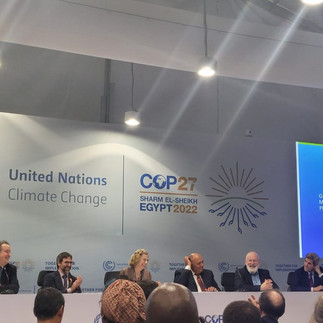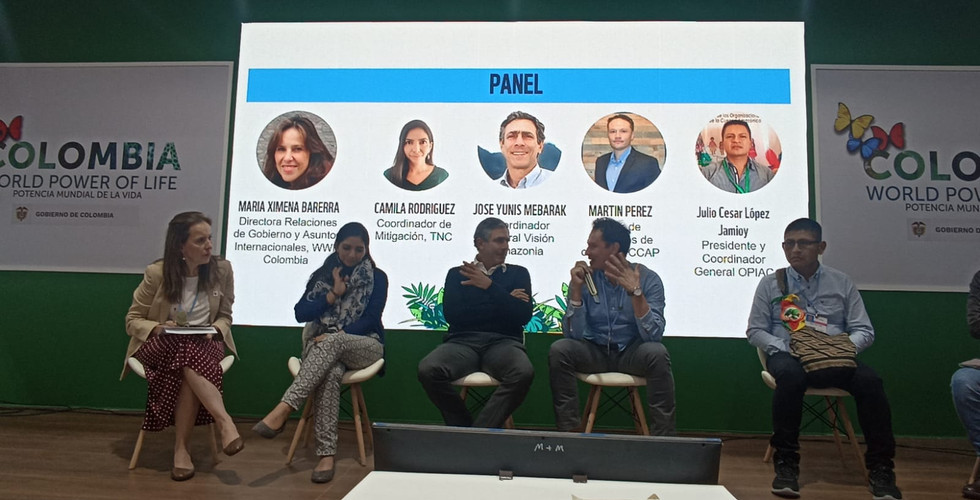Blog | COP27 Journey
- CCAP
- Nov 10, 2022
- 11 min read
Updated: Jun 29, 2023
CCAP was a part of the climate action in Sharm el-Sheikh, Egypt, from November 6-18, for the 2022 United Nations Climate Change Conference (COP27). CCAP kept a running blog throughout the two-week event with regular updates in which our on-site staff shared their behind the scenes stories from Sharm el-Sheikh, including takeaways, highlights, photos, insights, and more happening each day during the conference.
November 20:
The United Nations Climate Change Conference (COP27) negotiations in Sharm el-Sheikh went into the weekend and ended Sunday (November 20) morning with a breakthrough agreement to provide “loss and damage” funding for vulnerable countries hit hard by climate disasters. Countries delivered a package of decisions that reaffirmed their commitment to limit global temperature rise to 1.5 degrees Celsius above pre-industrial levels. The package also strengthened action by countries to cut greenhouse gas emissions and adapt to the inevitable impacts of climate change, as well as boosting the support of finance, technology and capacity building needed by developing countries.
Click here to view all the decisions made from Sharm el-Sheikh. Read the UNFCCC recap here.
Some Key Highlights:
COP27 significantly advanced the work on mitigation. A mitigation work programme was launched in Sharm el-Sheikh, aimed at urgently scaling up mitigation ambition and implementation. The program would “not impose new targets or goals” and will respect the nationally determined nature of NDCs but aims to support mitigation efforts on sectors covered in the 2006 IPCC Guidelines for National Greenhouse Gas Inventories’ and IPCC Working Group III of the 6th Assessment Report, and relevant enabling conditions, technologies, just transition and cross-cutting issues.
The Sharm el-Sheikh Implementation Plan, highlights that a global transformation to a low-carbon economy is expected to require investments of at least $4-6 trillion a year. Delivering such funding will require a swift and comprehensive transformation of the financial system and its structures and processes, engaging governments, central banks, commercial banks, institutional investors and other financial actors.
For climate finance, more than $2 billion will be mobilized for local communities and entrepreneurs to restore degraded land in Africa. The African Cities Water Adaptation fund established at COP27 will help hundreds of African cities to get the grants they need to provide people with safe, affordable and reliable water.
Brazil, the Democratic Republic of the Congo and Indonesia renewed commitments to preserve their tropical forests.
Countries launched a package of 25 new collaborative actions in five key areas: power, road transport, steel, hydrogen and agriculture.
New pledges, totaling more than $230 million, were made to the Adaptation Fund. These pledges will help many more vulnerable communities adapt to climate change through concrete adaptation solutions.
November 18:

On what was originally set to be the final day of COP27 (Friday, Nov. 18), CCAP prepared to head back home as countries continued to wrap up negotiations in Sharm el-Sheikh. Scroll through the content below and take a look back at our COP27 journey throughout the two-week conference. Stay tuned for our policy experts' key week two takeaways, which will be added to this story in the coming days.
November 17:
During the final thematic day (Solutions Day) at COP27, methane mitigation highlighted the climate action for CCAP. CCAP and Environment and Climate Change Canada (ECCC) launched the Recycle Organics-Caribbean Program, which builds on the existing Reciclo Orgánicos-Latin America program — which supports six countries throughout the region — to support an additional four Small Island Developing States (SIDS) to reduce methane emissions within the waste sector over a four-year period. The countries involved in this project are Belize, Grenada, Guyana and St. Lucia.

CCAP, along with its implementation partner ImplementaSur, will provide technical assistance and develop a pipeline of the projects within the municipal solid waste sector (MSW), while helping countries overcome regulatory barriers and creating enabling frameworks for project execution. The goal is to facilitate conditions for a sustained expansion of organic waste management technologies and accelerate methane mitigation projects that bring significant environmental, economic and social benefits to these countries.
“Canada is pleased to partner with the Global Methane Hub and the Center for Clean Air Policy to help Small Island Developing States (SIDS) in the Caribbean to reduce methane emissions,” said the Honourable Steven Guilbeault, Minister of Environment and Climate Change. “Our commitment to SIDS will provide new tools and mechanisms to help governments, civil society and private sector actors build the capacity to improve waste management systems that will support Nationally Determined Contributions (NDCs). Cutting methane emissions is one of the fastest and most cost-effective ways to combat climate change.”
ECCC has committed to investing CAD$4 million into the program, which aims to reduce the emission of gases such as methane that are harmful to the atmosphere, specifically those from the decomposition of organic matter in landfills. Go here to read the full release.

CCAP Executive Director Allison Bender-Corbett met with Belize Ministry of Sustainable Development, Climate Change and Disaster Risk Management CEO Dr. Kenrick Williams for an informal welcome to the new Recycle Organics-Caribbean program at our exhibit booth.
Allison later spoke during a panel on Waste Diversion and Segregation. During the event, the speakers discussed how national and local governments could work towards and show good examples of public policies, data information, and environmental justice consideration. They also talked about the relevance of public policy waste diversion and segregation as an opportunity for the Global South methane mitigation efforts. According to the latest studies, we have a huge methane mitigation opportunity in the waste sector, considering a goal of 35% emissions reduction by 2030. Learn more about the this event and its speakers here.
"Global Methane Pledge: From Moment to Momentum"
CCAP attended a Methane Ministerial convened by the United States and European Union. The event highlighted the progress of the Global Methane Pledge (GMP) and discussed further implementation steps, including enhanced efforts leading up to COP28. In the photos above, U.S. Special Presidential Envoy for Climate Change John Kerry is making his remarks on methane mitigation and keeping a 1.5°C temperature limit within reach.
In the year since it launched at COP26, the Global Methane Pledge has generated unprecedented momentum for methane action. Country endorsements of the GMP have grown from just over 100 last year to 150 today. Read more on the GMP progress by viewing this fact sheet linked here.
November 16:
Highlighting the COP27 action for CCAP today was the announcement of the policy brief publication, Towards a Common Pathway Across Sustainable Finance Taxonomies (By CCAP and GIZ).
The brief takes an in-depth look at taxonomies and provides a high-level overview of their relevance, key process principles and practical development steps. To enable cross-country learning and alignment, the policy brief also sets out a detailed comparison of select taxonomies that have already been adopted, many of which in emerging and developing countries, outlining key commonalities and divergences.
The publication is aimed to help readers familiarize themselves with the core concepts of taxonomies and key considerations for the development process. It also provides a basic orientation for countries that navigate through the taxonomy development process and further guides decision makers who embark on the journey of developing a national taxonomy by providing key information and insights. Learn more here!
November 15:
CCAP participated in a Side Event on "Mobilizing finance from Public and Private Sources: Experience Sharing from Bangladesh and other Parties."
Climate Finance Policy Associate Samantha Youngeun Shin served as one of the panelists for the event hosted by GIZ Bangladesh and the International Centre for Climate Change and Development (ICCCAD). CCAP shared the core elements of climate finance transparency and how enhanced transparency could catalyze public and private finance and investment flows needed for NDC implementation.
Given that Bangladesh is a Least Developed Country (LDC), which are particularly vulnerable to the climate impacts, critical needs of scaling up finance, including private sector investment was emphasized.

CCAP Executive Director Allison Bender-Corbett spoke at the Climate & Clean Air Coalition Ministerial event on Tuesday, November 15.
Here's what Allison had to say at the event:
"Developing countries have huge potential for mitigating emissions–their waste stream has a significantly higher percentage of organic waste compared to the developed world."
At the Ministerial, leaders from more than 40 countries reflected on progress made in the one year since the Global Methane Pledge was announced. Over half of the top 20 methane emitters are now part of the Pledge, representing half of global methane emissions and nearly two-thirds of the global economy. Read more here.
November 14:
CCAP opened Week 2 by co-hosting an Official COP27 Side Event with the Initiative for Climate Action Transparency (ICAT) and the Government of Nigeria. The event, titled Transparency to Drive Inclusive Climate Action and Mobilize Finance, explored how countries are arranging and implementing the Enhanced Transparency Framework (ETF) to enable inclusive and transformational climate action, employing forward-looking and innovative approaches in assessing climate mitigation, adaption, loss and damage and mobilizing climate finance.
CCAP Climate Finance Policy Associate Samantha Shin participated in the event, and other speakers included high-level government officials and national experts from ICAT partner countries. Representatives from the ICAT Secretariat and the ICAT Donor Committee also provided remarks. More information regarding the speakers and panelists can be found on the ICAT website here.
Some key takeaways from the panelists representing participating countries are mentioned below.
The essential needs and benefits of transparency in fostering national planning and implementation processes based on mutual trust were highlighted by panelists.
Senegal: The audience learned the progress of Senegal's transparency work including BTR reporting. It is important to align finance flows with national policies and to have national ownership
Kenya: Ms. Veronica Ndetu (Head of the Climate Change Unit, Ministry of Agriculture) highlighted the importance of making the linkage between NDCs, sectoral policies and indicators based on the experience from the Climate-Smart Agriculture transparency project
South Africa: Inclusive stakeholder consultation processes under the Climate Commission, science-based informed decision making, and transparent information sharing have been good practices in the country in driving a just transition.
Belize: Closing financing gaps as well as raising ambition could be possible with the implementation of transparency frameworks including data capture and monitoring.

Arriving in Sharm el-Sheikh, Egypt, for the Week 2 COP27 climate action was CCAP Executive Director Allison Bender-Corbett and Climate Finance Policy Associate Samantha Shin. CCAP is set to participate in several Side Events during the second week of the UN Climate negotiations. CCAP will also be hosting an Exhibit Booth (Blue Zone, Stand Number 22 - Agriculture, Food and Land) alongside co-exhibitor World Biogas Association.

November 12:
Read our policy experts' key takeaways and highlights from the opening week of COP27 below! Representing CCAP in Sharm el-Sheikh was Martin Perez (Carbon Markets Program Manager) and Adriana Bazán Fuster (Sr. Climate Finance Associate).
The USA announced that major Federal Government contractors would be required to publicly disclose their GHG emissions and climate-related financial risks and set science-based emissions reduction targets.
The Standing Committee on Finance (SCF) highlighted the possible challenges and opportunities by financial sector actors to implement Article 2.1(c), such as:
Transparency - In response, ensuring the robustness, credibility and transparency of financial sector targets and commitments is an emerging field of activity and initiatives
Persistent climate-related data gaps at the country, sector, entity and asset level - Continue to be an obstacle for the development of transition and physical climate risk assessments and decarbonization alignment methods.
The ad hoc work programme on the New Collective Quantified Goal on Climate Finance (NCQG) encourages that access to finance should be facilitated to all sources of finance (public and private) to enable the implementation of national investment plans aligned with nationally determined contributions (NDCs) and national adaptation plans (NAPs). Nevertheless, it does not encourage an operationalization of article 2.1c of the Paris Agreement.
Matters related to funding arrangements responding to loss and damage were officially included on the agenda for the first time in COP history.
President Biden announced major new U.S. actions and welcomed new international actions to rapidly reduce methane emissions, particularly in the energy sector, including strengthening proposed domestic methane standards in the oil and gas sector that would reduce wasted energy and harmful emissions from covered sources by 87 percent below 2005 levels while delivering economic benefits. More information can be found here.
November 11:

During the first week of COP27, CCAP Sr. Climate Finance Associate Adriana Bazán Fuster and Carbon Markets Program Manager Martin Perez met with representatives from Saint Lucia: Ms. Veronica Francis (Vice Consul, High Commission) & Hon. Shawn A. Edward (Minister for Education, Sustainable Development, Innovation, Science, Technology and Vocational Training).
The meeting occurred ahead of CCAP and Environment and Climate Change Canada announcing the new Recycle Organics-Caribbean program. The program will support Saint Lucia, Belize, Grenada and Guyana to reduce methane emissions within the waste sector.
CCAP was on-site and in attendance while U.S. President Joe Biden delivered his remarks on climate change at COP27 on Friday. President Biden spoke about the dangers of methane and deforestation, mentioning the Global Methane Pledge (GMP) and supporting developing countries in achieving their climate goals. Now more than 130 countries have signed on to covering more than half of the global methane emissions.
Methane is 80 times more potent than carbon, and it accounts for nearly half of the net warming we’re experiencing now. Cutting methane by at least 30 percent by 2030 can be our best chance to keep within reach of 1.5 degrees Celsius target. In his speech, the president announced an updated Methane Emissions Reduction Act Plan, which lays out how the United States is meeting the pledge. The Plan aims to reduce methane emissions in the U.S. from covered sources by 87 percent below the levels of 2005 by 2030. Check out this recent story regarding one of CCAP's methane mitigation projects in Peru.
Other highlights in his speech included the announcement of a number of measures, such as support for new early warning systems for extreme weather disasters in Africa, and a deal to back new solar and wind projects in Egypt in return for the country decommissioning gas power plants and cutting its emissions.
President Biden also noted that the U.S. will meet its emissions targets by 2030 and stated:
"Good climate policy is good economic policy."
President Biden additionally announced new U.S. initiatives at COP27 to tackle Climate Change. The details can be found here: http://bit.ly/3O0znZf.
November 9:
COP27's first thematic day took place on November 9 (Finance Day). This day was all about addressing several aspects of the climate finance ecosystem, including innovative and blended finance and financial instruments, tools and policies that have the potential to enhance access, scaling up finance and mobilizing financial resources from the public and private sector. Global leaders had a chance to reassert their commitments to climate action, along with a call to acknowledge and commit to finance for loss and damage. It is estimated that the world will require between $4 trillion and $7 trillion per year, to shift towards sustainable development and meet agreed Paris Agreement targets.
CCAP recently launched its new Climate Finance Program Fact Sheet, which can be found here.
In partnership with the UN Environment Programme (UNEP), Sr. Climate Finance Associate Adriana Bazán Fuster presented the opportunities to connect transparency in carbon markets and local welfare in the Panamá Pavilion.
One of the highlights of the day for CCAP was a World Wildlife Fund event in which Carbon Markets Program Manager Martin Perez presented at. The guide, “Fair Deals in REDD Projects: More for People” (co-authored by Martin) was launched during this panel session.
The Amazon is one of the areas with the greatest potential to absorb carbon and other greenhouse gas emissions and thus combat climate change. However, the great potential of this region in terms of biodiversity has contributed to making it a territory exposed to multiple threats.
This Guide seeks to support the understanding of carbon markets for local communities and Non-Governmental Organizations and become a tool that contributes to minimizing the risk of unfair treatment with the communities.
CCAP will continue working on the implementation of fair agreements during 2023 through the assessment of the safeguards' state of play in Latin America and creating capabilities in local communities within the Amazon basin. CCAP is also conducting research on how carbon markets could be used as a tool for community welfare through the development of just benefit-sharing systems.
To learn more about CCAP's carbon markets program, go here.
November 8:

On November 8, Carbon Markets Program Manager Martin Perez (in the center of the photo above) met with Duke University Nicholas School of the Environment students. CCAP and Duke University are researching carbon price and voluntary carbon markets' implementation around the world. More information on this initiative will be announced at a future date. To learn more about our Carbon Markets Program, visit our fact sheet linked here.
Sights and scenes from COP27!
The CCAP team was active in the November 8 climate discussions surrounding the topics of adaptation, mitigation, loss and damage and climate finance to name a few. CCAP followed the high-level dialogue from governments officials, climate envoys and other global experts, focusing on examining strategies to ramp up finance for nature-based solutions to the climate crisis.
November 6-7:

CCAP arrived in Sharm el-Sheikh, Egypt, for COP27 with Carbon Markets Program Manager Martin Perez and Sr. Climate Finance Associate Adriana Bazán Fuster (pictured above) representing the organization for the first week of the conference. CCAP will be attending events and following the key UN Climate discussions with world leaders and stakeholders from around the globe during both weeks of the event.























































































Comments